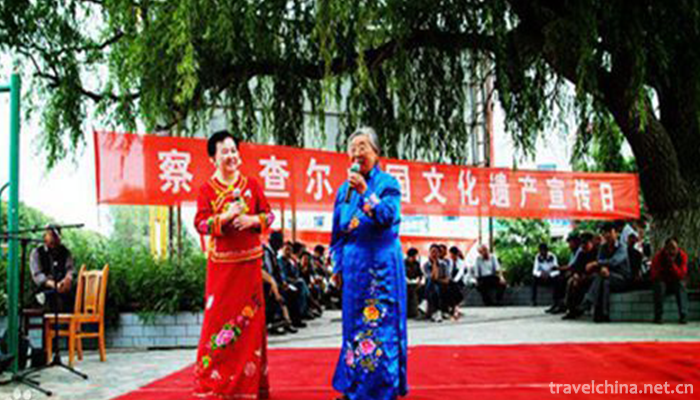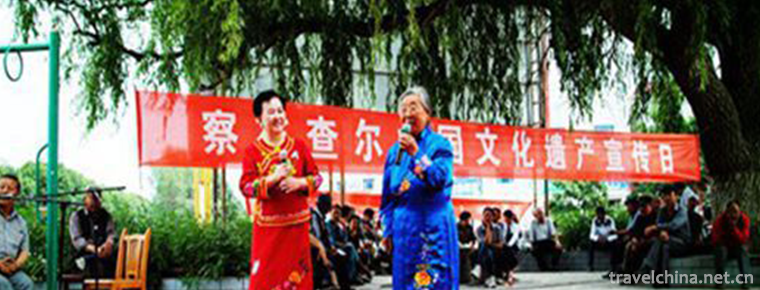Xibo Folk Songs
Xibo Folk Songs
Xibo folk song is an important kind of traditional music culture of Xibo nationality, which is widely spread among the Xibo people in Chabchal Xibo Autonomous County and Xinjiang. Folk songs are an important part of Xibo folk traditional art, which can be roughly divided into field songs, folk songs, nursery songs and narrative songs. There are few Xibo folk songs, but their modes are very complicated. Four tones, five tones, six tones, seven tones and more than twenty kinds. There are many special modes.
In November 2014, "Xibo Folk Song" was approved by the State Council to be included in the fourth batch of representative projects of national intangible cultural heritage.
historical origin
Xibo folk songs have a long history. They have been produced as early as the fishing and hunting culture period. For example, Aquinas and Butterfly Dance Songs have been spreading among the people all the time. They have gone through different stages of historical development and enriched the kinds of Xibo folk songs. They not only shine brilliantly in the humanistic spirit and social life of the Xibo people, but also become a display of the national tradition, national spirit and national life of the Xibo people. An artistic expression of character.
For generations, Sibo people, who are good at horseback riding and archery, often use Hunting and scattering as folk songs. Warm and unrestrained full sense of rhythm, and simple dynamic singing complement each other.
artistic characteristics
Content classification
Xibo folk songs can be divided into ancient Xianbei folk songs, fishing and hunting songs, shaman songs, narrative songs, field songs (love songs), custom songs, persuasion songs, motto songs, children's songs and new folk songs. Ancient Xianbei folk songs in Weishu Yuezhi contain records of such Xianbei folk songs as "Song of Achan" and "Song of the Real Man for the Real Man"; ancient fishing and hunting songs reflect the primitive fishing and hunting life in the period of mountain and forest culture; folk songs in the early Qing Dynasty include fishing and hunting songs, shaman songs, etc., and in the late Qing Dynasty there are field songs, custom songs, narrative songs, motto songs and nursery songs; folk songs in the period of the Republic of China are used for social improvement. Suggestion songs and aphorism songs are the main ones, such as Suggestion Song and Old People's Song. Folk songs after the founding of New China mainly eulogize the new era and new changes of folk songs such as "Chabuchar Good Place".
Melody lyrics
Xibo folk songs have their own fixed tunes, but there are no fixed lyrics. Every singer improvises according to different occasions. Xibo folk songs especially emphasize the rhyme of lyrics. Each line of lyrics requires rhyme of the beginning, middle and end. Therefore, singers are required not only to perform on the spot, but also to have the creative ability of poetry lyrics. This is a distinct feature of Xibo folk songs.
Representative Works
Azina is an ancient Sibo folk song. With its happy and graceful melody, it vividly reflects the primitive labor of the Xibo ancestors along the Nenjiang and Songhua rivers.
The Sibo Opera of Returning from the Northeast to the West is an immortal epic with a solid and well-founded narrative, especially for the Sibo people to establish an indestructible outlook on life, and to be eulogized from generation to generation.
"Song of Ages" sings about the Sibo people's amazing national spirit in the process of migration. At the same time, it summarizes some thoughts reflecting the law of their own survival and development in life.
"Jacina" Xibe folk song. "Jacina" means "black land" in Sibo. The history of the Sibo people's westward migration is that they have a deep feeling for their homeland.
Inheritance Significance
Xibo folk songs have been inherited from generation to generation in the Xibo people. In the eight catalogues of Xibo Autonomous County of Chabu Chal, a large number of folk song inheritors such as Tong Limei, Guo Xiaomei and Fu Yuqiang have emerged among the people. Therefore, the mass basis of Xibo folk song's singing, dissemination and inheritance is very deep. However, with the change of Sibo language environment, the number of people who use Sibo language decreases, and the survival space of this original ecological folk culture is shrinking. It is urgent to protect and inherit Sibo folk songs.


-
2.Global Dinosaur City Scenic Spot
The National 5A Tourist Scenic Spot Global Dinosaur City, located in Xinbei District, Changzhou, Jiangsu Province, is a comprehensive tourism resort with dinosaur theme
Time 2018-12-06 -
3.Baishuiyang Yuanyangxi Tourist Area
Baishuiyang Mandarin Creek is located in Pingnan County, Ningde City, Fujian Province. It is 170 kilometers away from Fuzhou and 101 kilometers away from Ningde
Time 2018-12-08 -
4.Yunpu Dongtian Tourist Area
Yimeng Yunpu Cave Tianshan Scenic Area is located in Feixian County, Shandong Province. There are five scenic spots: Tour Stone, Tianmeng Lake, Drunken Stone Forest
Time 2018-12-22 -
5.Gongchangling Hot Spring Skiing Ground
Gongchangling Skiing Ground is located in Tanghe Scenic Area of Gongchangling, Liaoyang City, Liaoning Province. It covers an area of 100 hectares and is a national AAA-class tourist attraction.
Time 2019-01-12 -
6.Bru
Bru, Mongolian means throwing. Competitions are divided into two categories: long throw and accurate throw, mostly held in festive festivals. The long throw is to decide
Time 2019-04-04 -
7.Production Techniques of Buyi Medical Herbs for Benefiting Liver
Guiding County, Guizhou Province, is a subtropical monsoon rheumatic fever climate with distinct seasons, rich heat, long frost-free period, abundant rainfall and complex and
Time 2019-04-04 -
8.Traditional Manufacturing Techniques of Tofu
The traditional craft of tofu production is a traditional handicraft with a long history. Refers to the various methods of making tofu, tofu can be fried and stewed at will, lasting
Time 2019-04-28 -
9.kylin dance
Kirin dance, also known as "Wu" Kirin, is a court dance performance of the Ming Dynasty in China. It was spread among the people when the Nanming Dynasty perished. When dancing,
Time 2019-06-10 -
10.Wuju Opera
Wu Opera, commonly known as Jinhua Opera, is one of the local operas in Zhejiang Province. It centers on Jinhua area and is popular in Jinhua, Lishui, Linhai, Jiande, Chun'an, Yushan, Shangrao, Guixi,
Time 2019-06-30 -
11.Production Techniques of Yixing Purple Sand Pottery
Yixing Purple Sand Pottery Manufacturing Techniques, Dingshu Town, Yixing City, Jiangsu Province, local folk traditional pottery making techniques, one of the national intangible cultural heritage.
Time 2019-07-12 -
12.Civil Aviation Flight University Of China
The school is directly under the Civil Aviation Administration of China. Its predecessor was established in May 1956 with the approval of Premier Zhou Enlai. Chairman Mao Zedong appointed the aviation
Time 2019-08-31